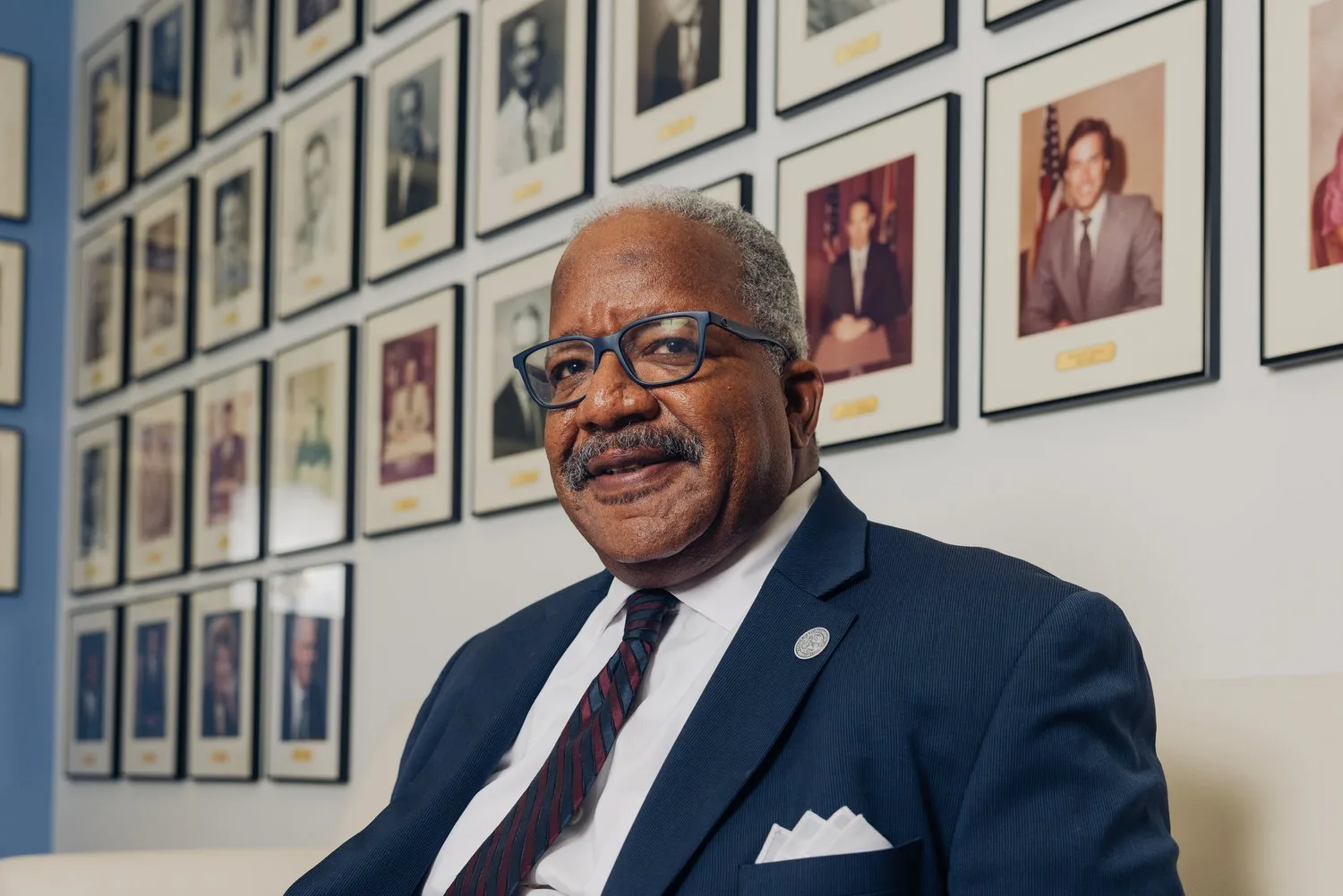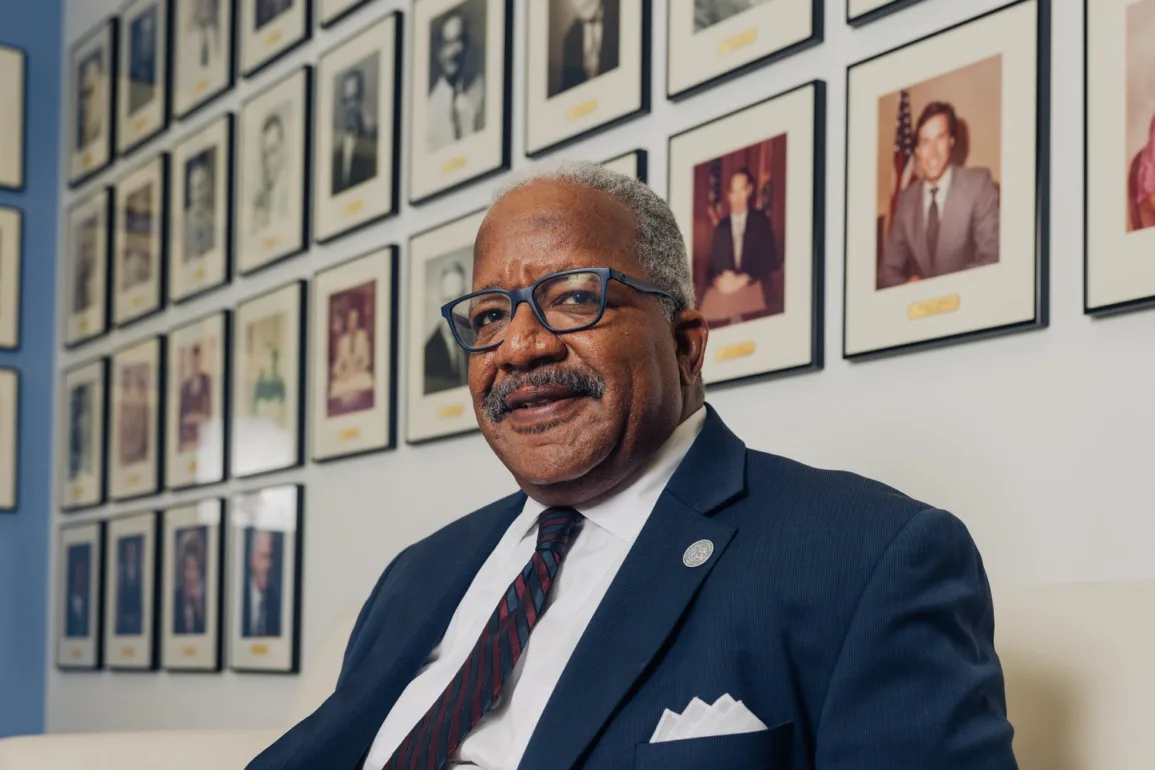
That history is complicated but not different from other places in the South that are grappling with a brutal past of racial injustice. And James is acutely aware of the past.
Standard Oil tycoon Henry Morrison Flagler, the man responsible for developing the Atlantic coast of Florida, arrived in the West Palm Beach region in 1893. Flagler described the area, home to the Jaega Tribe, as “a veritable paradise” and connected it to Miami with the Florida East Coast Railway, built by Black laborers.
Flagler harbored grand plans to turn Palm Beach into a playground for the rich and erect a city on the west side of Lake Worth for service workers.
He used Black laborers to build two majestic Palm Beach hotels, The Breakers and the Royal Poinciana. He wanted construction workers to live close by in the Styx, a community of palmetto and driftwood shacks, boardinghouses and shanties, according to historian Everee Jimerson Clarke, whose grandfather once lived there.
The men who did the menial jobs at white-owned estates occupied the Styx until landowners began to realize the value of their properties on the shores of the turquoise Atlantic. All sorts of stories exist about what caused a Black exodus from Palm Beach, but in her book, Pleasant City, West Palm Beach, Clarke attributes it to a fire and unsanitary conditions.
Styx residents were forced to find housing in segregated West Palm Beach, mostly in the neighborhoods just north and west of downtown like Coleman Park and Pleasant City. This was where the butlers, nannies, maids, construction workers, and chauffeurs who served the rich residents of Palm Beach lived. And still do.
Recently, the city of West Palm Beach has redeveloped several buildings in Pleasant City to resemble the shotgun-style homes that once peppered the streets. Called the Styx Promenade, the mixed-use project pays homage to African American history and intends to return the vibrancy that once was here.
It’s one of several city undertakings James mentions on our tour. Throughout our conversations, he brings up a number often: 93 million. That’s how many dollars the city has invested in underserved neighborhoods while he has been mayor.
We stop by a community garden established by the city in conjunction with Florida A&M University, a historically Black university in Tallahassee. We are within walking distance of downtown’s enormous wealth, and yet there are no grocery stores with fresh food in this neighborhood.
“This is a food desert,” James says. “That’s why this affiliation with FAMU is important.”
A young boy notices our parked black SUV and rushes up to say hello to James as though Jay-Z had just arrived at the Marcy Projects.
“The mayor! The mayor is here!” he yells.
In the garden, I meet Nyota King-Sanyang, a 40-year-old Black woman who works for the FAMU agricultural Extension program but also owns her own African apparel and accessories import business, which she launched in 2018 after visiting The Gambia. She, too, has been touched by the mayor’s programs. She feels lucky to be living in a Pleasant City house that her father owns. Otherwise, she might not be able to afford the rent.
“Mayor James does have a lot of positive initiatives,” she says. “But that to me is a double-edged sword, like, property taxes going through the roof.”
With all the new construction, property taxes on her house shot up from $1,100 a year to $3,500 last year.
“So how do you satisfy everyone? I guess that’s his issue,” King-Sanyang says. “Mayor James is doing the best he can with the hand he was dealt. Change is hard.”
A $20 million city project called Coleman Park Renaissance includes 43 new, affordable homes and neighborhood commercial space for minority-owned businesses constructed on 11 vacant lots donated by the city.
Another venture James points out is the redevelopment of Currie Park, named after George Currie, the man responsible for developing Pleasant City after Black people were forced out of Palm Beach. Currie named the streets with words like Beautiful, Merry, Contentment, Comfort, and Cheery because he felt Black people were innately happy, Clarke writes in her book. Many of the names have now been replaced with numbers, but some remain.
I gaze out of the car window at the dilapidation and decay: weeds bursting out of cracked concrete, burglar bars and trash-strewn lots. This was once a neighborhood that truly reflected all the emotions the streets were named after. There were thriving businesses and vibrant homes. Musicians like Count Basie, Ella Fitzgerald, and Louis Armstrong came to play at The Sunset Lounge.
That was before poverty choked Black neighborhoods and burdened them with crime, drugs, and homelessness. The challenges for the city seem daunting, but James remains optimistic.
“As the CEO of this city, I use my bully pulpit to encourage the private sector to invest in programs that will benefit the residents of the blighted neighborhoods,” James says.
A big part of his plan includes entrepreneurial development. To that end, he applied to be a part of the first cohort of fellows in a program run by E Pluribus Unum, a nonprofit launched in 2019 by former New Orleans Mayor Mitch Landrieu to tackle the daunting problem of racial inequity in America.
E Pluribus Unum conducted an exhaustive survey across 13 Southern states and used its findings to come up with three major goals: to cultivate leaders committed to realizing a more inclusive vision for the South; to champion policies intended to reverse the legacy of Jim Crow; and to change the narratives that perpetuate racism.
James used the $75,000 he received as an Unum fellow as seed money to launch Jumpstart Academy, a program intended to equip minority small business owners with the skills needed to develop an idea into a sustainable company.
“Communities, particularly communities of color, that have strong entrepreneurial ecosystems are healthier,” James says.
His goal was to reach people like King-Sanyang and the Hepburns, who have big ideas but little access to resources like banks that won’t lend to businesses that are too tiny or without established credit scores.
Jumpstart Academy also allows business owners to network with peers and more experienced entrepreneurs who help lead the 10 weeks of classes and sessions.
King-Sanyang told me that before graduating from Jumpstart Academy, her business skills were poor. She didn’t know how to keep an inventory of her imports from The Gambia or pay business taxes.
Unum Executive Director Scott Hutcheson lauds James and his efforts to lift all boats. Equity, Hutcheson says, does not have to be a political buzzword. It’s about giving people what they need to accomplish their goals.
“We are divided by design,” he tells me over the phone. “People start their journeys and have access to the American dream at different points. And we created those points. This is not an accident.
“What Mayor James is doing — getting Black-owned, Black-serving businesses up and running — is an equity move.”
After our tour of dizzying development in downtown West Palm Beach, I ask James the quintessential question: What difference can one small program make? It seems so unfairly matched against the billions of dollars being invested in real estate and infrastructure.
“I really wanted to have something which touched people where they were, and where you can have a tangible demonstration that lives have been changed,” he says. “The academy expanded the universe of possibilities for [Hepburn] and her family. And that’s what it’s all about.”
Then James repeats words I have heard him utter before: “Every 1,000-mile journey begins with the first step.”



